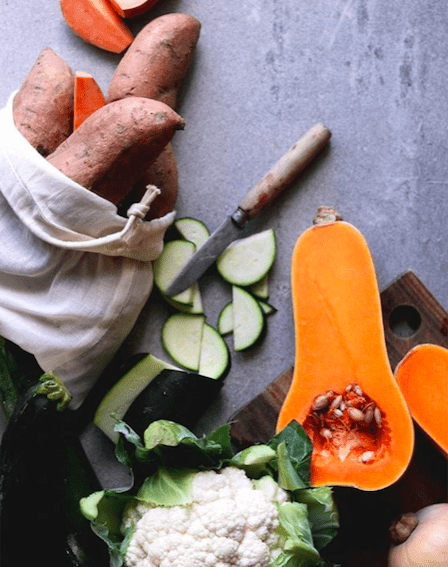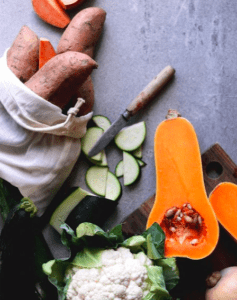
26 Aug The Value of Vegetable-Rich, Banana-Free Smoothies
The ingredients in the picture below may not look like a typical list for a smoothie spread, but steaming and freezing these vegetables and adding them to your smoothie makes for the most filling, thick breakfast blends. Steaming the vegetables first makes them easier to digest, and both zucchini and cauliflower are tasteless thereby giving you full control of the flavor with your smoothie add ons.

The reasons for limiting fruits with a high glycemic load such as bananas, pineapple, mango are multiple. High fruit concentrated smoothies can really put us on a blood sugar roller coaster ride and spike our insulin. This can lead to cravings, reduced fat metabolism, and hormonal imbalance. Fruit is also not as satiating as vegetables.
Sugar is sugar. Well controlled human trials have concluded that honey, fruit and refined sugars all cause an increase in blood sugar. This doesn’t mean we need to avoid fruit entirely, in fact, whole fruit can be packed with antioxidants as well as nutrients and therefore an important addition to a healthy diet. Eating fruit in moderation is the key and combining them with fats help reduce their glycemic load. Berries are always a great choice because of their high water content and polyphenol-rich antioxidant content.
Adding good fats and fiber from flax oil and ground flax seeds as well as chia seeds and avocados will help keep you satiated longer, control your blood sugar, boost your brain health and aide with hormone balance. Omega 3 fatty acids are anti-inflammatory and the lignans from ground flax seeds help feed the good bacteria in your gut and improve bowl function (and elimination). Added bonus, these fats will also give your smoothie that glorious nice thick consistency for hours in case you prefer a room temperature smoothie. If you tolerate legumes, beans are another great low glycemic, high fiber, protein addition to your smoothies.
If you need more sweetness than that from berries, simply add 1/4 banana or a date or two. Vanilla extract and spices like cinnamon can also impart sweetness to your smoothie drink. You can also sparingly add cultured almond or coconut milk which has a creamy yogurt consistency and is sweetened with fruit juice. Just try to keep sweeteners like maple syrup, coconut sugar, agave syrup, fruit juices etc all to a minimum or avoid them altogether and limit your use of honey where possible. The main intention here is to make yourself aware of the amount of added sugars that are in our everyday foods and to retrain your tastebuds to become more sensitive to sweet flavors. Honey, stevia, and sugars from fruit do not negatively affect our microbiome. Other sweeteners however do trigger an inflammatory reaction within our gut lining and directly affect the microbiota (population of gut bugs necessary for keeping our immune system intact). So try and get in the habit of checking food labels, even health food branded products like cultured ‘plain’ almond yogurt contain fruit juice as a sweetener.
It’s also worth repeating that these are general guidelines only. For some of you, fruit may not adversely affect your constitution and you may be able to tolerate more servings than others. While others may have difficulty digesting cruciferous vegetables or need to avoid nightshades like zucchini. Listen to your body and consider food sensitivity testing to help you hone in on what foods make your body feel great. And if you prefer warmer smoothies, forgo the freezing altogether and just steam your veggies instead or where tolerable, have them raw.
If you continue to experience digestive issues despite following a hypoallergenic diet, you may want to consider using nutrients to help heal your intestinal lining. Food sensitivities are the direct result of dysbiosis (leaky gut) and nutrients like glutamine and probiotics can have an enormous impact on quelling these antigen-antibody reactions by repairing and restoring the integrity of the mucosal membrane.
This is about progress, not perfection. Try to do what you can to continue learning and growing, moment by moment and day by day. I’m here to help. Feel free to call, drop me a line, or book an appointment. My blog is also full of articles on various topics related to digestion and wellness.
In honor of your highest health potential, here’s to flavorful plant based smoothie bowls packed with fibre, quality protein, healthy fats and antioxidants that will keep you nourished and energized for hours!
Dr Tasnim Adatya
Naturopathic Physician, Menopause Clinician, Acupuncturist, and Health Educator
